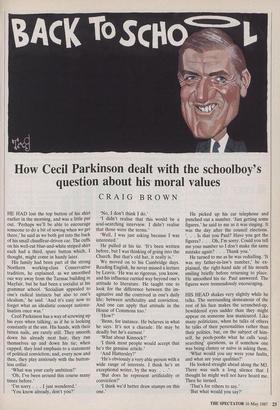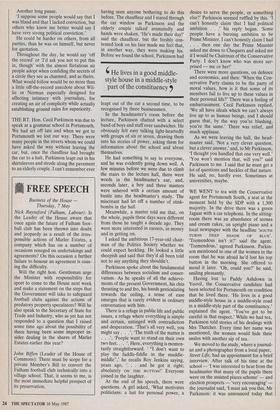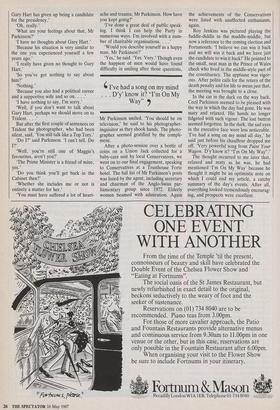How Cecil Parkinson dealt with the schoolboy's question about his
moral values
CRAIG BROWN
HE HAD lost the top button of his shirt earlier in the morning, and was a little put out. 'Perhaps we'll be able to encourage someone to do a bit of sewing when we get there,' he said as we both got into the back of his small chauffeur-driven car. The cuffs on his well-cut blue-and-white striped shirt each had a third, spare button which, I thought, might come in handy later.
His family had been part of the strong Northern working-class Conservative tradition, he explained, as we smoothed our way away from the Tarmac building in Mayfair, but he had been a socialist at his grammar school. 'Socialism appealed to one's radical instincts but also to one's idealism,' he said. 'And it's easy now to forget what an idealistic concept nationa- lisation once was.'
Cecil Parkinson has a way of screwing up his eyes when talking, as if he is looking constantly at the sun. His hands, with their bitten nails, are rarely still. They smooth down his already neat hair; they run themselves up and down his tie; when cupped, they lend emphasis to a statement of political conviction; and, every now and then, they play anxiously with the button- less collar.
`What was your early ambition?'
`Oh, I've been around this course many times before.'
`I'm sorry . . . I just wondered.'
`You know already, don't you?' `No, I don't think I do.'
`I didn't realise that this would be a soul-searching interview. I didn't realise that those were the terms.'
`Well, I was just asking because I was interested.'
He pulled at his tie. 'It's been written before, but I was thinking of going into the Church. But that's old hat, it really is.'
We moved on to his Cambridge days. Reading English, he never missed a lecture by Leavis. 'He was so rigorous, you know, and his influence carried way beyond one's attitude to literature. He taught one to look for the difference between the im- aginative and the contrived in one's daily life; between artificiality and conviction. And one can apply that attitude in the House of Commons too.'
`How?'
`Berm, for instance. He believes in what he says. It's not a charade. He may be deadly but he's earnest.'
`What about Kinnock?'
`I think most people would accept that he's the genuine article.'
`And Hattersley?'
`He's obviously a very able person with a wide range of interests. I think he's an exceptional writer, by the way. . .
`But does he represent artificiality or conviction?'
`I think we'd better draw stumps on this one.' He picked up his car telephone and punched out a number. 'Just getting some figures,' he said to me as it was ringing. It was the day after the council elections.
. . Is that you Paul? Have you got the figures? . . . Oh, I'm sorry. Could you tell me your number so I don't make the same mistake again? . . . Thank you.'
He turned to me as he was redialling. 'It was my father-in-law's number,' he ex- plained, the right-hand side of his mouth smiling briefly before returning to place. He smoothed his tie. Paul answered. The figures were tremendously encouraging.
HIS HEAD shakes very slightly while he talks. The surrounding demeanour of the rest of his face makes the scrunched-up, bewildered eyes sadder than they might appear on someone less manicured. Like many politicians, when he talks of others he talks of their personalities rather than their politics, but, on the subject of him- self, he pooh-poohs what he calls 'soul- searching' questions, as if somehow one was being clumsy or naive in asking them.
`What would you say were your faults, and what are your qualities?'
He looked straight ahead along the M3. There was such a long silence that I thought he might well not have heard me. Then he turned.
`That's for others to say.'
`But what would you say?' Another long pause.
`I suppose some people would say that I was bland and that I lacked conviction, but others who know me better would say I have very strong political conviction.'
He could be harder on others, from all parties, than he was on himself, but never for quotation.
Throughout the day, he would say 'off the record' or 'I'd ask you not to put this in, though' with the almost flirtatious air people adopt when confiding the secrets of a circle they see as charmed, and as theirs. What would follow would be no more than a little off-the-record anecdote about Wil- lie or Norman especially designed for affecting intimacy with journalists, for creating an air of complicity while actually establishing ground rules for superiority.
THE RT. Hon. Cecil Parkinson was due to speak at a grammar school in Portsmouth. We had set off late and when we got to Portsmouth we lost our way. There were many people in the streets whom we could have asked the way without leaving the car, but, once the chauffeur had brought the car to a halt, Parkinson leapt out in his shirtsleeves and strode along the pavement to an elderly couple. I can't remember ever having seen anyone bothering to do this before. The chauffeur and I stared through the car window as Parkinson and the elderly couple talked animatedly and hands were shaken. 'He's made their day!' said the chauffeur, but the freshly con- tented look on his face made me feel that, in another way, they were making his. Before we found the school, Parkinson had 4 He lives in a good middle- style house in a middle-style part of the constituency leapt out of the car a second time, to be recognised by three businessmen.
In the headmaster's room before the lecture, Parkinson chatted with a select band of boys and staff over sandwiches. He obviously felt easy talking light-heartedly with groups of six or seven, drawing them into his stories of power, asking them for information about the school and 'about themselves.
He had something to say to everyone, and he was evidently going down well. A few minutes before we were due to climb the stairs to the lecture hall, there were words in the headmaster's ear, and, seconds later, a boy and three masters were ushered with a certain amount of bustle into the headmaster's study. The miscreant had let off a number of stink- bombs in the hall.
Meanwhile, a master told me that, on the whole, pupils these days were different from those he taught a decade ago. They were more interested in careers, in money and in getting on.
I asked the ambitious 17-year-old chair- man of the Politics Society whether we could expect heckling. He looked a little sheepish and said that they'd all been told not to say anything they shouldn't.
Parkinson spoke about the fundamental differences between socialism and conser- vatism. As he speaks of all the achieve- ments of the present Government, his chin thrusting to and fro, his hands gesticulating towards the ceiling, a sense of ease emerges that is rarely evident in ordinary conversation with him.
There is a refuge in public life and public issues, a refuge where everything is simple and certain, untinged with contradiction and desperation. 'That's all very well, you might say . . .'; `The truth of the matter is .'; 'People want to stand on their own two feet.. . '. Here, everything is momen- tarily straightforward. "I don't want to play the fuddle-fiddle in the muddle- middle",' he recalls Roy Jenkins saying, years ago, . . and he got it right; absolutely ON THE BUTTON!' Everyone joined in the laughter.
At the end of his speech, there were questions. A girl asked, 'What motivates politicians: a lust for personal power, a desire to serve the people, or something else?' Parkinson seemed ruffled by this. 'I can't honestly claim that I had political ambition . . .' his reply began. 'Some people have a burning ambition to be Prime Minister. I can't honestly claim I had . . then one day the Prime Minister asked me down to Chequers and asked me if I would be Chairman of the Conservative Party. I don't know who was more sur- prised — me or her!'
There were more questions, on defence and economics, and then: 'When the Con- servative Party claims to be the party of moral values, how is it that some of its members fail to live up to these values in their personal life?' There was a feeling of embarrassment. Cecil Parkinson replied, `We all have ideals which we can't always live up to as human beings, and I should guess that, by the way you're blushing, you're the same.' There was relief, and much applause.
As we were leaving the hall, the head- master said, 'Not a very clever question, but a clever answer,' and, to Mr Parkinson, thought you handled that one very well.' `You won't mention that, will you?' said Parkinson to me. I said that he must get a lot of questions and heckles of that nature. He said, no, hardly ever. Sometimes at universities, maybe.
WE WENT to tea with the Conservative agent for Portsmouth South, a seat at the moment held by the SDP with a 1,300 majority. In the drive there was a green Jaguar with a car telephone. In the sitting- room there was an abundance of scones and cream cakes, an upright piano and a local newspaper with the headline 'SOUTH TURNS DEEP SHADE OF BLUE'.
`Tremendous isn't it?' said the agent. `Tremendous,' agreed Parkinson. Parkin- son mentioned to one of the women in the room that he was afraid he'd lost his top button in the morning. She offered to mend it later. 'Oh, could you?' he said, smiling pleasantly.
Having lost to Paddy Ashdown in Yeovil, the Conservative candidate had been selected for Portsmouth on condition that he lived there. 'He lives in a good middle-style house in a middle-style road in a middle-style part of the constituency,' explained the agent. 'You've got to be careful in that respect.' While we had tea, Parkinson told stories of his dealings with Mrs Thatcher. Every time her name was mentioned, the women would hide their smiles with another sip of tea.
We moved to the study, where a journal- ist and a photographer from a local paper, Street Life, had an appointment for a brief interview. After talk of his time at the school — 'I was interested to hear from the headmaster that many of the pupils there were on the assisted places scheme' — and election prospects — 'very encouraging' the journalist said, `I must ask you this, Mr Parkinson: it was announced today that Gary Hart has given up being a candidate for the presidency.'
`Oh, really.'
`What are your feelings about that, Mr Parkinson?'
`I have no thoughts about Gary Hart.'
`Because his situation is very similar to the one you experienced yourself a few years ago.'
`I really have given no thought to Gary Hart.'
`So you've got nothing to say about him?'
`Nothing.'
`Because you also had a political career and a supportive wife and so on. . .
`I have nothing to say, I'm sorry.'
`Well, if you don't want to talk about Gary Hart, perhaps we should move on to Trident. . .
But after the first couple of sentences on Trident the photographer, who had been silent, said, 'You still talk like a Top Tory.'
`Do I?' said Parkinson. 'I can't tell. Do I?'
`Well, you're still one of Maggie's favourites, aren't you?'
`The Prime Minister is a friend of mine, yes.'
`Do you think you'll get back in the Cabinet then?'
`Whether she includes me or not is entirely a matter for her.'
`You must have suffered a lot of heart- ache and trauma, Mr Parkinson. How have you kept going?'
`I've done a great deal of public speak- ing. I think I can help the Party in numerous ways. I'm, involved with a num- ber of charitable organisations„ .
`Would you describe yourself as a happy man, Mr Parkinson?'
`Yes,' he said. 'Yes. Very.' Though even the happiest of men would have found difficulty in smiling after those questions, 4 I've had a song on my mind . . . D'y' know it? "I'm On My Way" Mr Parkinson smiled. 'You should be on television,' he said to his photographer- inquisitor as they shook hands. The photo- grapher seemed gratified by the compli- ment.
After a photo-session over a bottle of coins on a Union Jack collected for a baby-care unit by local Conservatives, we went on to our final engagement, speaking to Conservatives at a Trusthouse Forte hotel. The full list of Mr Parkinson's posts was listed by the agent, including secretary and chairman of the Anglo-Swiss par- liamentary group since 1972. Elderly women beamed with admiration. Again the achievements of the Conservatives were listed with unaffected enthusiasm, again.
Roy Jenkins was pictured playing the fuddle-diddle in the muddle-middle, but now a reference to the coming election and Portsmouth: 'I believe we can win it back and we will win it back and we have just the candidate to win it back!' He pointed to the small, neat man in the Prince of Wales check who lived in the middle-style part of the constituency. The applause was vigor- ous. After polite calls for the return of the death penalty and for life to mean just that, the meeting was brought to a close.
In the car in the dark on the way back, Cecil Parkinson seemed to be pleased with the way in which the day had gone. He was maty and relaxed. His hands no longer fidgeted with such vigour. The lost button seemed forgotten. In the dark, the sad eyes in the executive face were less noticeable. `I've had a song on my mind all day,' he said just before his chauffeur dropped me off. 'Very powerful song from Paint Your Wagon. D'y'know it? "I'm On My Way".'
The thought occurred to me later that, relaxed and maty as he was, he had mentioned 'I'm On My Way' because he thought it might be an optimistic note on which I could end my article, a catchy summary of the day's events. After all, everything looked tremendously encourag- ing, and prospects were excellent.






















































 Previous page
Previous page